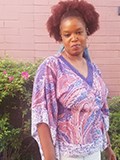A Ghazal for Black Boys
by Rosalind Guy
There’s never enough space on my phone to hold all the photos
of the little black boys I’ve loved, those who are dead and those living.
We carry so much history in our lips and our bones that it curves
the spine, makes us love too hard black boys we want to keep alive.
In the tradition of my mother and grandmother, I’ve tried planting
flowers, a garden, but only the morning glory flowers manage to keep living.
My uncle once killed a man over space once made for loving in the arms
of his girl; he languished in concrete cells, stopped knowing joy, was barely living.
Bullets shatter our boys’ bodies and the watchers, aroused, smile
like gaslit fools when reporters tell half-stories of their limited living.
My dearest Kingston, Tyshawn, Ta’Shun, Tyquan, Trayvon, Michael, Tamir...
we will refuse to romanticize your memory and continue to carve spaces for living.
I started writing a version of this poem a few years ago, after a young black boy was murdered in the back seat of his mother’s car. The car was stolen while she was inside the store; he had been asleep in the back seat. Another senseless killing, which rightly inspires outrage. But I found that I felt something else, too: a desperate and clinging grief. Then a young black pre-teen committed suicide after experiencing homophobic bullying from his classmates. And the feeling was there again. Not a new feeling, but a heavier version of the original feeling. With each new death of a black boy that I read about, the feeling continued to grow. The poem went through several iterations as I tried to find the right container to hold what I needed to say. In the end, the ghazal felt like the right form because I was forced to trim until I was left with the poem as it appears now: a form that leaves room for documenting grief experiences without exploiting other people’s pain and simultaneously leaving room for the reader to exist in the space of the poem and feel.

Rosalind Guy is a high school English teacher. She recently received an MFA from the University of Memphis. Her poems and essays have appeared or will appear in African Voices, Juke Joint, Glass Poetry Journal: Poets Resist, and Georgia Review.